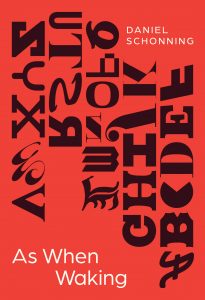Phoenix Poets Interview: Daniel Schonning
As we continue to celebrate the amazing writers, editors, and translators in our Phoenix Poets series, we’re delighted to highlight poet Daniel Schonning, whose debut collection will be published this month. As When Waking is an exploration of poetic form, centering on the alphabet as both its medium and constraint, including twenty-six abecedarians. Here, Schonning discusses the writers that inspire him, reflects on his experience as a teacher, and shares insight into his working style.
Tell us a little about yourself and your relationship to poetry.
Early in my writing life, I didn’t understand when writers would talk about the community they found in words—reading and writing both felt like such a (sweetly, nourishingly, but ultimately) lonely process. I spent much of my writing life thinking of a poem as, to borrow from Robert Hass, “elegy to what it signifies”—something beautiful but futile, rear-facing. But lately, in what hopefully comes off in a not-too-granola-y way, I’ve felt the real vitality of poems—that they’re not just signs or gravestones, but living things whose existence both exceeds and encompasses the poet that wrote them. As Jorie Graham writes in “Dawn Day One,” “I’m actually staring up at / you, you know, right here, right from the pool of this page. / Don’t worry where else I am, I am here. Don’t / worry if I’m still alive, you are.” In ways eerie and wonderful, poems make progeny of their readers—and, I’ve come to believe, look forward as much as they do back.
What’s something you’re particularly excited about with your new book? (Are you working in any experimental forms, does it depart from your previous work, etc?)
In George Oppen’s The Materials—the first collection after the poet’s twenty-five-year departure from the field—he writes one especially lovely poem about bicycles. It closes with the words “. . . mechanisms. Light and miraculous.” This phrase was, for a time, a working title for this collection—in part because the project of As When Waking feels like it participates in the same sort of wonder, absurdity, and even mechanical complexity that Oppen conjured: a miraculous light cast on the mundane. We forget the wonder of bicycles exactly the way that we forget the wonder of the alphabet. So, in a roundabout answer to the question: I’m excited that this book, composed of twenty-six abecedarians and heaps of letter-focused forms, keeps its balance for as long as it does and—for me—makes the mundane miraculous.
What makes you excited to be a poet working today?
So many things! But one recent example comes to mind: For the last five years, I’ve taught at a small college called Hobart and William Smith. This semester, I’m in the middle of a class called “The American Epic,” and one of the things we’re exploring together is what constitutes an “epic”—whether the piece takes part in making a culture and a language; its relationship to a shared “nation” of people; its scope, heft, and breadth. And the trick of the class is that the more we look and the closer we look at any given work, the more we see these qualities in every piece. Poems that read at first as utterly personal or confessional seem, with enough attention and time, to capture a huge cross-section of people and experience. Pithy little bits of lyric feel, with enough attention and time, like microcosms for whole ecosystems of thought and feeling, like revolutionary gestures that shake the foundations of the language in which they’re written. And this revelation has lately captured what I love about poetry: The more you listen, the more that there is to hear. Working with college students has made me feel that there are more and better listeners than ever before, which is extraordinarily exciting.
Tell us a little about your process—is there something or someone you draw inspiration from, a particular routine or practice you work with, or any rules you set for yourself?
My writing friends and I refer to the two types of writers as “slopes” and “spikes.” Slopes wake up early, work dutifully, and produce writing at an even clip—on an imaginary graph of productivity, their line “slopes” steadily upwards. Spikes, as I’m sure is obvious, are their opposite. Spikes scrawl ideas on cocktail napkins and cardboard coffee sleeves. They leave their dinner burning on the stove when the urge to write finds them unexpectedly. I am (unfortunately enough) a spike. But participating in both innovated and inherited forms helps to give a container and an engine to the work, to give more points of entry to voices other than my own in composing each poem, which I’ve found is the best remedy for what is otherwise a lot of time spent waiting around for poems to wander into the room.

Daniel Schonning’s poetry has been published in Orion Magazine, Poetry Daily, POETRY Magazine, The Yale Review, and elsewhere. He lives in the Finger Lakes region of New York, where he teaches creative writing at Hobart and William Smith Colleges and serves as a poetry editor for Seneca Review.
As When Waking is available through our website. Use the code UCPNEW to take 30% off when you order directly from us.
